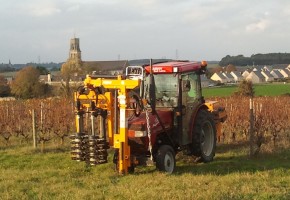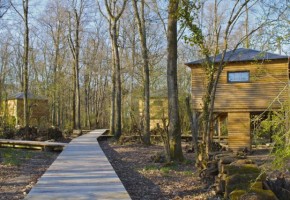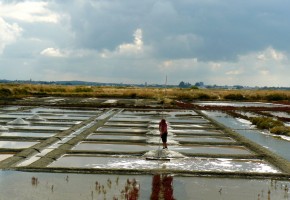
You’re not going to find me using the term ‘natural’ wine anytime soon. It has to be the most confusing ‘label’ given to wines for a long time. There is no legal definition of ‘natural’ – so confusing for the consumer trying to get to grips with all the many approaches to growing vines and making wine.
Surely we all agree on one point – that growers should be using the minimum of pesticides/herbicides to ensure they can produce a decent wine and enable them to make a living. I think it’s also pretty clear that in order to make an ‘interesting’ wine, that reflects a sense of place, there needs to be a ‘living soil’. Soil that is dead and eroded, that has been battered by years of chemicals and pesticides is unlikely to be capable of producing wines that are balanced, interesting and have a real sense of place because that sense of place has been beaten out of the very soil in which the vines are planted.
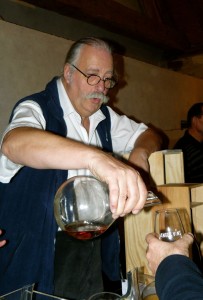
Eddy Oosterlinck-Bracke – inspiring biodynamic producer in the Layon.
The large majority of production in France (over 75%) is conventional. Conventional viticulture uses, to a greater or lesser extent, chemicals and synthetic products to deal with problems in the vineyard. Within this 75% there are growers that routinely use products when they are not even necessary and there are those who resolutely avoid their use except in exceptional circumstances. They can be a whisker away from organic in terms of their approach but are not certified and so reserve the right to use a product if circumstances deem it necessary.
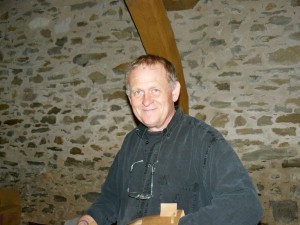
Patrick Baudouin makes wonderful wines in Anjou
Around 80% of the growers we work with at le tasting room are certified organic and the remaining 20% are growers who are also passionate about the environment and work with this in mind. We did not specifically seek out organic growers because they are ‘organic’ – we found them because they are making amazing wines and amazing wines come from people who are passionate about what they do. People who invest all their time and energy in their craft, who are out in their vineyards every day, who look after the soil and create an environment that attracts wildlife and insects, birds and bees, who encourage the vines to thrive and don’t push them beyond their natural limits.

Joseph Paillé – part of a small family business making fabulous wines
These people for the most part are making wines ‘naturally’ – but what does that mean. Does natural mean that there is no intervention, that the vineyard looks after itself, that the wine makes itself? Of course not, it means huge amounts of time spent working the soil, pruning accurately and effectively, observing and reacting. It also means taking the utmost care in the winery, monitoring the fermentations and looking after the wines both pre and post fermentation. For the most part these wines are made using the local natural yeasts that are present on the skins of the grapes and practically no sulphur if any is used apart from at bottling (which protects the wines).
So does this mean that all organic wines are great? No, of course not – just because a grower is working organically and adopting a natural approach doesn’t guarantee you a wonderful wine. There are fantastic, amazing, delicious wines and there are dreadful ones too. We are too keen to ‘label’ wines according to their method of production and see this as a guarantee of quality. It is not.

Delightful organic Montlouis-sur-Loire from Jean-Christophe Rault
We absolutely love the wines of Pithon-Paillé. They are about as natural in terms of production as you could find. Their vineyards are bursting with wildlife, they work hard and limit yields, they prune and they thin bunches and spray with yoghurt bacteria to avoid confusing the rare Belargus butterflies that live on Les Treilles (their amazing vineyard in the heart of the Layon valley). In the winery, it’s the natural yeasts that get the fermentations going and then the wines are transferred to barrels that lay quietly doing their thing until the fermentations are over. There’s no sulphur added, the barrels are kept filled to the brim to avoid oxidation and a teensy dose of Sulphur is added at bottling to protect them. Does this make them ‘natural’. Well yes of course, in the real sense of the word – wine is a natural product made from freshly gathered grapes and it’s future is determined by man. If you don’t take care in the winery, your wines will spoil. If you don’t use Sulphur to protect against oxidation then you must ensure your tanks/barrels are kept topped up. Would I label them as natural winemakers. Personally no, I would label them great winemakers, who make wines that have a real sense of place, are clear expressions of the passion and commitment that they invest in their work. Jo Pithon has been making great wines for decades (long before the natural wine debate entered our vocabulary) and Jo Paillé is carrying on that approach. And Wendy Paillé will tell you that they work in the way that they do because they like to make great wines that they enjoy themselves and by far the best way to do this is to work with nature.
Is it shere coincidence that our favourite wine at the recent Saumur SoBio tasting was a Chenin called Clos de L’Ecotard made by Michel Chevré. A wine coming from a tiny parcel worked by one man and his horse? We were not seeking out natural wines, just great wines, and this was the wine that blew us away.

The totally delicious Clos de L’Ecotard from Michel Chevré
We are not against the growers who are not certified organic. They work hard and working organically is more risky and more expensive. More and more growers are seeking to change their approach and the little steps taken are positive. Reducing the amount of intervention both in the vineyard and the winery is a good thing and one that should be encouraged.
It is difficult to produce large volumes of standardised wine without the use of chemicals in the vineyard and intervention in the winery. This is not our market and it holds no interest for us personally but it has its role on the world market place – a place where wine is a beverage rather than a story. And why not? There are many products around the world that are far less natural than a basic bottle of wine.
For us, the pleasure in wine is the people behind the wine, the shared passion of the countryside and the reflection of that land in the bottle. Each parcel of vines has a story to tell and treating it with care and respect preserves it for the future.

